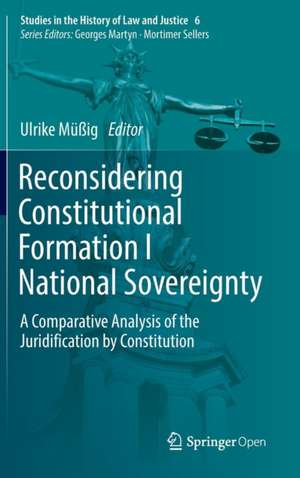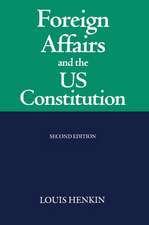Reconsidering Constitutional Formation I National Sovereignty: A Comparative Analysis of the Juridification by Constitution: Studies in the History of Law and Justice, cartea 6
Editat de Ulrike Müßigen Limba Engleză Hardback – 20 aug 2016
Legal studies and consequently legal history focus on constitutional documents, believing in a nominalist autonomy of constitutional semantics. Reconsidering Constitutional Formation in the late 18th and 19th century, kept historic constitutions from being simply log-books for political experts through a functional approach to the interdependencies between constitution and public discourse. Sovereignty had to be ‘believed’ by the subjects and the political élites. Such a communicative orientation of constitutional processes became palpable in the ‘religious’ affinities of the constitutional preambles. They were held as ‘creeds’ of a new order, not only due to their occasional recourse to divine authority, but rather due to the claim for eternal validity contexts of constitutional guarantees.
The communication dependency of constitutions was of less concern in terms of the preamble than the constituents’ big worries about government organisation. Their indecisiveness between monarchical and popular sovereignty was established through the discrediting of the Republic in the Jacobean reign of terror and the ‘renaissance’ of the monarchy in the military resistance against the French revolutionary and later Napoleonic campaigns. The constitutional formation as a legal act of constituting could therefore defend the monarchy from the threat of the people (Albertine Statute 1848), could be a legal decision of a national constituent assembly (Belgian Constitution 1831), could borrow from the old liberties (Polish May Constitution 1791) or try to remain in between by referring to the Nation as sovereign (French September Constitution 1791, Cádiz Constitution 1812).
Common to all contexts is the use of national sovereignty as a legal starting point. The consequent differentiation between constituent and constituted power manages to justify the self-commitmentof political power in legal terms. National sovereignty is the synonym for the juridification of sovereignty by means of the constitution. The novelty of the constitutions of the late 18th and 19th century is the normativity, the positivity of the constitutional law as one unified law, to be the measure for the legality of all other law. Therefore ReConFort will continue with the precedence of constitution. (www.reconfort.eu)
| Toate formatele și edițiile | Preț | Express |
|---|---|---|
| Paperback (1) | 421.55 lei 6-8 săpt. | |
| Springer International Publishing – 14 iun 2018 | 421.55 lei 6-8 săpt. | |
| Hardback (1) | 428.84 lei 6-8 săpt. | |
| Springer International Publishing – 20 aug 2016 | 428.84 lei 6-8 săpt. |
Din seria Studies in the History of Law and Justice
- 18%
 Preț: 2111.92 lei
Preț: 2111.92 lei - 18%
 Preț: 1006.55 lei
Preț: 1006.55 lei - 18%
 Preț: 778.45 lei
Preț: 778.45 lei - 15%
 Preț: 642.51 lei
Preț: 642.51 lei - 18%
 Preț: 1001.50 lei
Preț: 1001.50 lei - 18%
 Preț: 1120.81 lei
Preț: 1120.81 lei -
 Preț: 436.57 lei
Preț: 436.57 lei - 18%
 Preț: 727.31 lei
Preț: 727.31 lei - 18%
 Preț: 1116.26 lei
Preț: 1116.26 lei - 18%
 Preț: 784.92 lei
Preț: 784.92 lei - 18%
 Preț: 724.00 lei
Preț: 724.00 lei - 18%
 Preț: 1006.72 lei
Preț: 1006.72 lei - 18%
 Preț: 994.72 lei
Preț: 994.72 lei - 20%
 Preț: 563.40 lei
Preț: 563.40 lei -
 Preț: 351.88 lei
Preț: 351.88 lei - 18%
 Preț: 941.68 lei
Preț: 941.68 lei - 24%
 Preț: 1139.34 lei
Preț: 1139.34 lei - 18%
 Preț: 1118.30 lei
Preț: 1118.30 lei - 18%
 Preț: 779.89 lei
Preț: 779.89 lei - 18%
 Preț: 893.40 lei
Preț: 893.40 lei - 18%
 Preț: 891.65 lei
Preț: 891.65 lei - 20%
 Preț: 577.42 lei
Preț: 577.42 lei - 15%
 Preț: 655.78 lei
Preț: 655.78 lei - 18%
 Preț: 1009.70 lei
Preț: 1009.70 lei - 24%
 Preț: 1075.29 lei
Preț: 1075.29 lei - 18%
 Preț: 897.95 lei
Preț: 897.95 lei - 18%
 Preț: 951.77 lei
Preț: 951.77 lei
Preț: 428.84 lei
Nou
Puncte Express: 643
Preț estimativ în valută:
82.06€ • 85.92$ • 68.06£
82.06€ • 85.92$ • 68.06£
Carte tipărită la comandă
Livrare economică 10-24 aprilie
Preluare comenzi: 021 569.72.76
Specificații
ISBN-13: 9783319424040
ISBN-10: 3319424041
Pagini: 324
Ilustrații: XIII, 284 p. 1 illus. in color.
Dimensiuni: 155 x 235 x 18 mm
Greutate: 0.59 kg
Ediția:1st ed. 2016
Editura: Springer International Publishing
Colecția Springer
Seria Studies in the History of Law and Justice
Locul publicării:Cham, Switzerland
ISBN-10: 3319424041
Pagini: 324
Ilustrații: XIII, 284 p. 1 illus. in color.
Dimensiuni: 155 x 235 x 18 mm
Greutate: 0.59 kg
Ediția:1st ed. 2016
Editura: Springer International Publishing
Colecția Springer
Seria Studies in the History of Law and Justice
Locul publicării:Cham, Switzerland
Cuprins
Juridification by Constitution. National Sovereignty in the 18th and 19th c. Europe; Ulrike Müßig.- National sovereignty in the Belgian Constitution of 1831. On the meaning(s) of article 25; Brecht Deseure.- The Omnipotence of Parliament in the legitimisation process of ‘representative government’ during the Albertine Statute (1848-1861); Giuseppe Mecca.- Sovereignty Issue in the Public Discussion in the Era of the Polish 3rd of May Constitution; Anna Tarnowska.- Appendix: English translation of the Statute ‘Our free Royal Cities in the States of Rzeczpospolita’ of April 18, 1791 by Ulrike Müßig and Max Bärnreuther, together with Inge Bily.- About the Authors.- Index.
Notă biografică
Ulrike Müßig, née Seif, is the head of the Chair for Civil Law, German and European Legal History at the University of Passau. After studies of Law at the Universities of Würzburg and Cambridge, and as a visitor at the Université Paris II, Panthéon-Assas, she conducted her doctoral dissertation at the Institute for Comparative Law at the University of Würzburg and at the Hamburg Max Planck Institute for Foreign and International Private Law. In 2000 she completed her postdoctoral qualification (habilitation) at the University of Würzburg in the areas of European and German Legal History, Civil Law, Comparative Law and International Private Law, funded by the Bayerischen Habilitationsförderpreis (1996). Her postdoctoral thesis “Recht und Justizhoheit” on comparative legal history has won the Heisenberg Prize of the DFG (German Research Foundation) 2000, appeared in a second edition 2009 and in a Spanish edition “El juez legal” 2014.
In 2013 UlrikeMüßig received the ERC Advanced Grant ReConFort, Reconsidering Constitutional Formation (1.9 million €) for her research project on Comparative Constitutional History in 18th and 19th century Europe. Since 2014 she is a corresponding member of the National Academy al Andalus in the historic-judicial class (Ilustre Sociedad Andaluza de Estudios Histórico-Jurídicos). In April 2015 Prof. Dr. Ulrike Müßig was elected into the historical-philosophical class of the Austrian Academy of Sciences.
In 2013 UlrikeMüßig received the ERC Advanced Grant ReConFort, Reconsidering Constitutional Formation (1.9 million €) for her research project on Comparative Constitutional History in 18th and 19th century Europe. Since 2014 she is a corresponding member of the National Academy al Andalus in the historic-judicial class (Ilustre Sociedad Andaluza de Estudios Histórico-Jurídicos). In April 2015 Prof. Dr. Ulrike Müßig was elected into the historical-philosophical class of the Austrian Academy of Sciences.
Textul de pe ultima copertă
Legal studies and consequently legal history focus on constitutional documents, believing in a nominalist autonomy of constitutional semantics.Reconsidering Constitutional Formation in the late 18th and 19th century, kept historic constitutions from being simply log-books for political experts through a functional approach to the interdependencies between constitution and public discourse. Sovereignty had to be ‘believed’ by the subjects and the political élites. Such a communicative orientation of constitutional processesbecame palpable in the ‘religious’ affinities of the constitutional preambles. They were held as ‘creeds’ of a new order, not only due to their occasional recourse to divine authority, but rather due to the claim for eternal validity contexts of constitutional guarantees.
The communication dependency of constitutions was of less concern in terms of the preamble than the constituents’ big worries aboutgovernment organisation. Their indecisiveness between monarchical and popular sovereignty was established through the discrediting of the Republic in the Jacobean reign of terror and the ‘renaissance’ of the monarchy in the military resistance against the French revolutionary and later Napoleonic campaigns. The constitutional formation as a legal act of constituting could therefore defend the monarchy from the threat of the people (Albertine Statute 1848), could be a legal decision of a national constituent assembly (Belgian Constitution 1831), could borrow from the old liberties (Polish May Constitution 1791) or try to remain in between by referring to the Nation as sovereign (French September Constitution 1791, Cádiz Constitution 1812).
Common to all contexts is the use of national sovereignty as a legal starting point. The consequent differentiation between constituent and constituted power manages to justify the self-commitment of political power in legal terms. National sovereignty is the synonym for the juridification of sovereignty by means of the constitution. The novelty of the constitutions of the late 18th and 19th century is the normativity, the positivity of the constitutional law as one unified law, to be the measure for the legality of all other law. Therefore ReConFort will continue with the precedence of constitution. (www.reconfort.eu)
The communication dependency of constitutions was of less concern in terms of the preamble than the constituents’ big worries aboutgovernment organisation. Their indecisiveness between monarchical and popular sovereignty was established through the discrediting of the Republic in the Jacobean reign of terror and the ‘renaissance’ of the monarchy in the military resistance against the French revolutionary and later Napoleonic campaigns. The constitutional formation as a legal act of constituting could therefore defend the monarchy from the threat of the people (Albertine Statute 1848), could be a legal decision of a national constituent assembly (Belgian Constitution 1831), could borrow from the old liberties (Polish May Constitution 1791) or try to remain in between by referring to the Nation as sovereign (French September Constitution 1791, Cádiz Constitution 1812).
Common to all contexts is the use of national sovereignty as a legal starting point. The consequent differentiation between constituent and constituted power manages to justify the self-commitment of political power in legal terms. National sovereignty is the synonym for the juridification of sovereignty by means of the constitution. The novelty of the constitutions of the late 18th and 19th century is the normativity, the positivity of the constitutional law as one unified law, to be the measure for the legality of all other law. Therefore ReConFort will continue with the precedence of constitution. (www.reconfort.eu)
Caracteristici
This is an open access book First book to provide an international and interdisciplinary survey on "National Sovereignty" Brings together top scholars from Belgium, Germany, Italy and Poland Offers insights on the much debated issue of how to justify a constitution Includes an English translation of the Statute Our free Royal Cities in the States of Rzeczpospolita
















